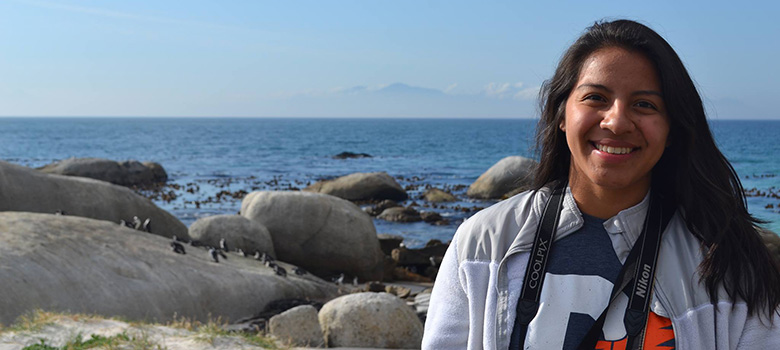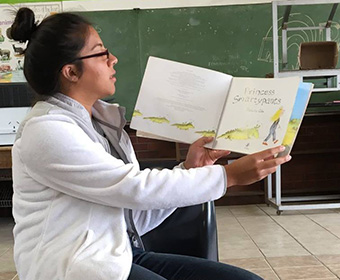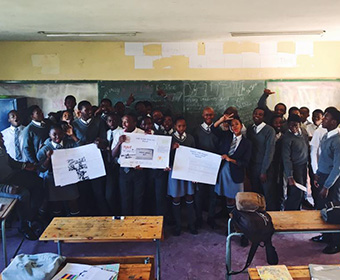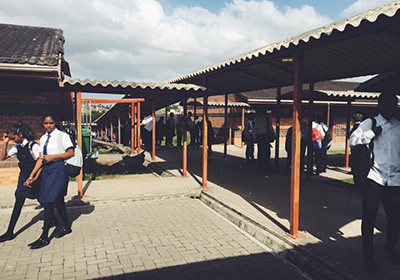
(July 19, 2017) – This summer was the first time that Brianna Diaz has ever travelled outside of the United States. The first-gen student flew alone for 20 hours across the Atlantic Ocean to Johannesburg, South Africa, preparing for a six-week trip as a recipient of the U.S. Department of State’s Benjamin A. Gilman International Scholarship.
The Gilman program allows American students to study or intern abroad and gain proficiency in diverse languages and cultures.
“My first impression was noticing how similar life in Johannesburg is to San Antonio,” said Diaz, an Honors College student and UTSA Top Scholar. “The city is very developed, and I noticed families are very close.”
Diaz spent her first two days in the program with the program director and 15 other students touring Johannesburg. They visited museums and Nelson Mandela’s home, and learned about the history of South Africa and apartheid. Then they traveled 350 miles southeast to Durban, South Africa, where they stayed with host families. Diaz lived with a mom whose adult children have moved out of the home.

“She helped me a lot. She encouraged me to explore the city and embrace this once in a lifetime opportunity,” Diaz said.
During most of the trip, Diaz focused on school practicums. She spent half of her time in an inner city primary school and the other half at a secondary school in a township where she noticed vast differences. She noticed that the inner city school had more teachers and smaller class sizes. It also offered clubs for students and its students were demographically more diverse. In contrast, the township school didn’t have enough desks for its students and its science laboratory was barely functioning. Diaz said the differences revert back to the apartheid.
“During apartheid, whites were in the cities so that’s where the resources were invested.”

She said all the students carried a positive attitude about school, something American students often take for granted.
“The students were so eager to learn and go to school,” Diaz said. “They were super obedient to their teachers.”
Diaz also visited non-governmental organizations to see how they improve student success in the South African education system. Her favorite was called TREE, Training and Resources in Early Education, which works in rural areas where residents don’t have access to early childhood development classes. Members of TREE are training community members to teach these classes.
Overall, Diaz said observing how South Africans celebrate their diversity was the greatest learning experience.
“We paint ourselves as a melting pot, but after seeing the diversity in South Africa, I see that we still have a lot of work to do in American cultures,” said Diaz.
Back at UTSA, the Gilman scholar plans to host a panel to share her personal study abroad experiences with first-generation students like herself.

“My experiences were so amazing. I loved every second of the program. Making connections with people I never thought I’d meet - learning more about a person and sharing things about myself and helping them learn too… it was really fun and I want other UTSA students to have the same experiences,” Diaz said. “I’m so grateful I am able to use all the resources UTSA has provided to me so I can come back and share this with other Roadrunners.”
UTSA is ranked among the top 400 universities in the world and among the top 100 in the nation, according to Times Higher Education.
Learn more about UTSA's first-generation family.
Explore UTSA’s Study Abroad opportunities.
Learn more about the UTSA Top Scholar program.
Learn more about the UTSA Honors College.
Connect with UTSA online at Facebook, Twitter, YouTube, Instagram and LinkedIn.
UTSA Today is produced by University Communications and Marketing, the official news source of The University of Texas at San Antonio. Send your feedback to news@utsa.edu. Keep up-to-date on UTSA news by visiting UTSA Today. Connect with UTSA online at Facebook, Twitter, Youtube and Instagram.
After getting your student settled in their room, connect with other UTSA families at our Family Get Together. Attendees need to RSVP for the event.
Rock & Brews Restaurant - 5702 Landmark Pkwy, San Antonio, TX 78249Late Night at the Rec is an awesome UTSA tradition that turns a typical information session into an exciting night of fun. It's a unique opportunity to meet new people and reconnect with old friends.
Campus RecreationCheer on the UTSA Soccer team as they take on Lamar in the first home game of the season.
Park West FieldShow your UTSA pride with our spirited crew—Rowdy, Cheer, the Spirits of the Roadrunner, and the incredible Spirit of San Antonio Marching Band (SOSA)—as we light up the night in true Roadrunner style.
Main Campus East Lawn, Main CampusAnnual Giving will host a First Day of School celebration to welcome students back to campus. We will have giveaways and photo opportunities.
Sombrilla Plaza, Main CampusEnjoy snacks while connecting with Adobe reps and student ambassadors. Download or log into the Adobe Express app to snag swag and unlock exclusive back-to-school templates. It’s a fun, fast way to get creative and start the school year with bold moves.
Central Plaza, Main CampusCelebrate the merger of UTSA and UT Health San Antonio with a pop-up featuring free t-shirts, exclusive swag, and interactive photo opportunities. Open to all students, faculty and staff. Supplies are limited!
Sombrilla Plaza, Main CampusThe University of Texas at San Antonio is dedicated to the advancement of knowledge through research and discovery, teaching and learning, community engagement and public service. As an institution of access and excellence, UTSA embraces multicultural traditions and serves as a center for intellectual and creative resources as well as a catalyst for socioeconomic development and the commercialization of intellectual property - for Texas, the nation and the world.
To be a premier public research university, providing access to educational excellence and preparing citizen leaders for the global environment.
We encourage an environment of dialogue and discovery, where integrity, excellence, respect, collaboration and innovation are fostered.